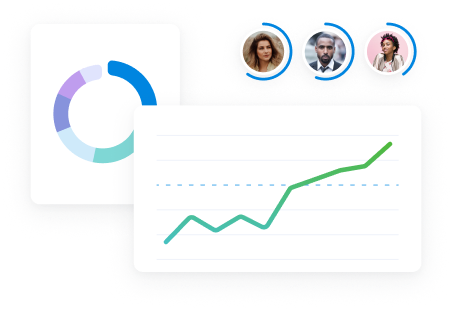Looking for Scoro alternatives? Don’t worry. We’re not mad.
We love our platform and believe in what it can do.
But after working with thousands of professional services firms, we also know that Scoro might not be a perfect fit for everyone’s maturity stage, workflows, or budgets.
So here are our honest thoughts on some of the top Scoro alternatives out there, including their best features, pricing, and how they stack up against our own professional services automation (PSA) tool.
Download the PSA evaluation cheatsheet
Make your tool comparison simple, structured, and objective. Our free checklist helps you score platforms feature-by-feature and see which PSA fits your business best.
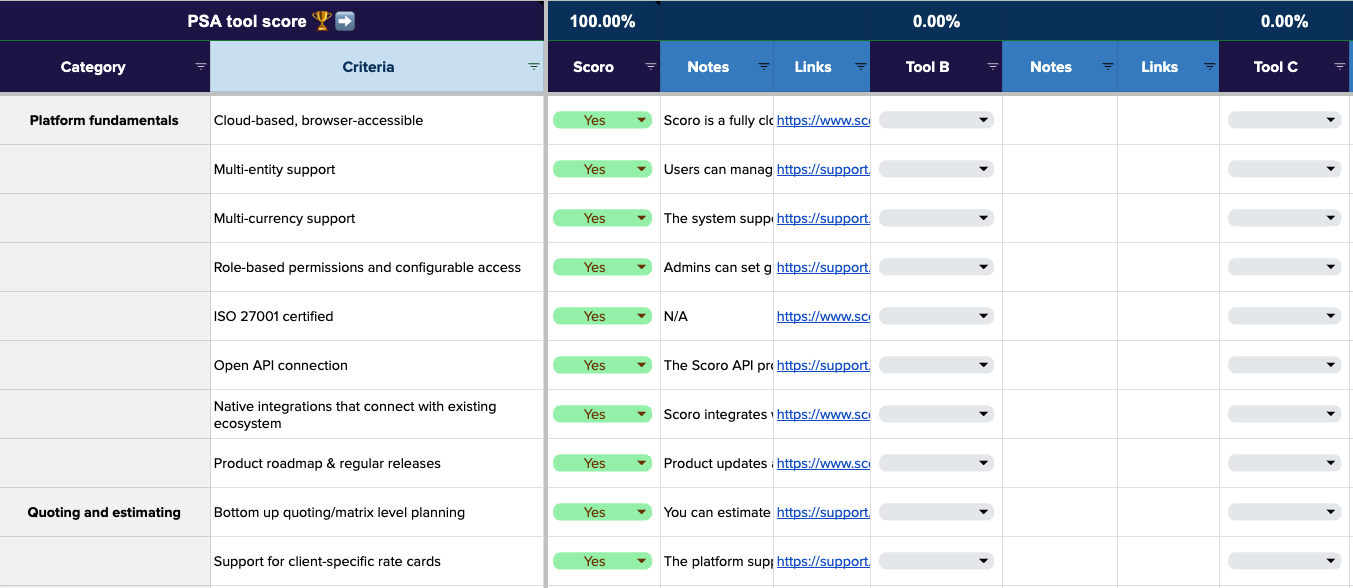
1. Accelo
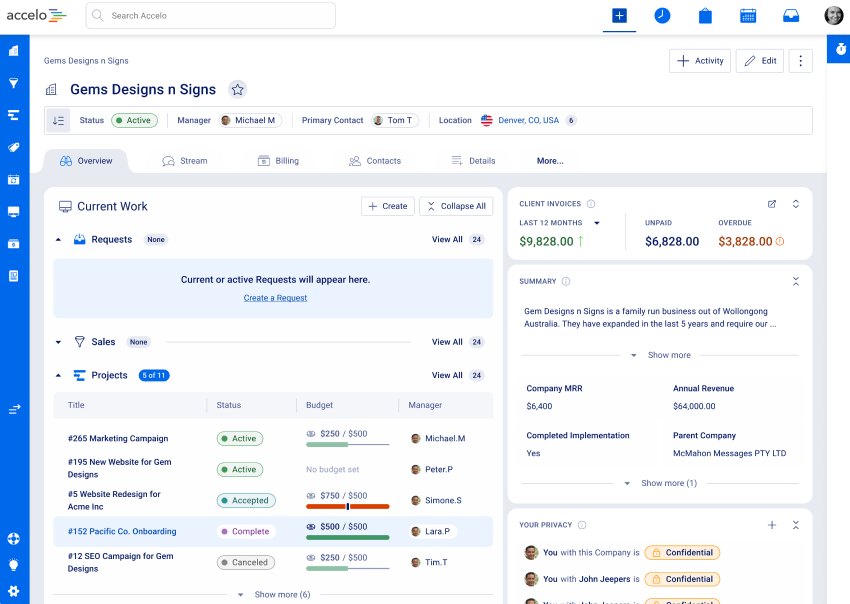
Accelo is a PSA platform that’s been serving agencies, consultancies, and other professional services firms since 2009.
The brand is particularly known for its CRM capabilities. Accelo also recently acquired Forecast to add AI and capacity planning features to their product.
Features you’ll like
- Client management: Track all client interactions through Accelo’s “Stream” feature, which consolidates emails, tasks, and project updates in one chronological view
- Retainers dashboard: Manage recurring work and subscription-based services with built-in retainer tracking (something many competitors don’t have)
- Project templates: Launch similar projects quickly using pre-built templates with standard tasks, timelines, and workflows already set up
- Financial management: Simplify revenue recognition, track payment histories, and analyze revenue streams across your entire portfolio
- Business intelligence: Access real-time, centralized metrics for key operational insights
- Resource scheduling: Schedule by skill, role, and availability with real-time team capacity analysis and workload management
Integrations
Accelo integrates natively with 18 tools, including:
- Microsoft 365
- Google Workspace
- QuickBooks
- Xero
- Salesforce
- Hubspot
- Jira
- Stripe
- Expensify
- Zapier
Pricing
Exact pricing is available on request, but Accelo offers four plans depending on the features you need:
- Professional
- Business
- Advanced
- Elite
Accelo vs. Scoro
Where Accelo wins:
- Superior client communication tracking: Accelo’s “Activity Stream” feature consolidates all client interactions—emails, tasks, project updates—in one chronological timeline
- Process automation: Accelo’s automation features let you auto-populate project plans, progress actions by rules, and send automated emails to get work done faster
Where Scoro wins:
- Transparent pricing: Scoro offers clear, published pricing tiers, while Accelo requires sales conversations for pricing information
- More advanced quoting: Scoro’s matrix-style quoting with approval workflows is more sophisticated than Accelo’s basic quoting functionality
- More integrations: Scoro offers 60+ integrations compared to Accelo’s 18
Bottom line: Accelo is great for firms that want to centralize client communications alongside their key business processes, while Scoro works better if you need more advanced business and sales management.
Further reading: Learn how creative agency Kojo transitioned from Accelo to Scoro and saved up to three days on quote building while gaining better financial visibility.

2. Kantata (Mavenlink)
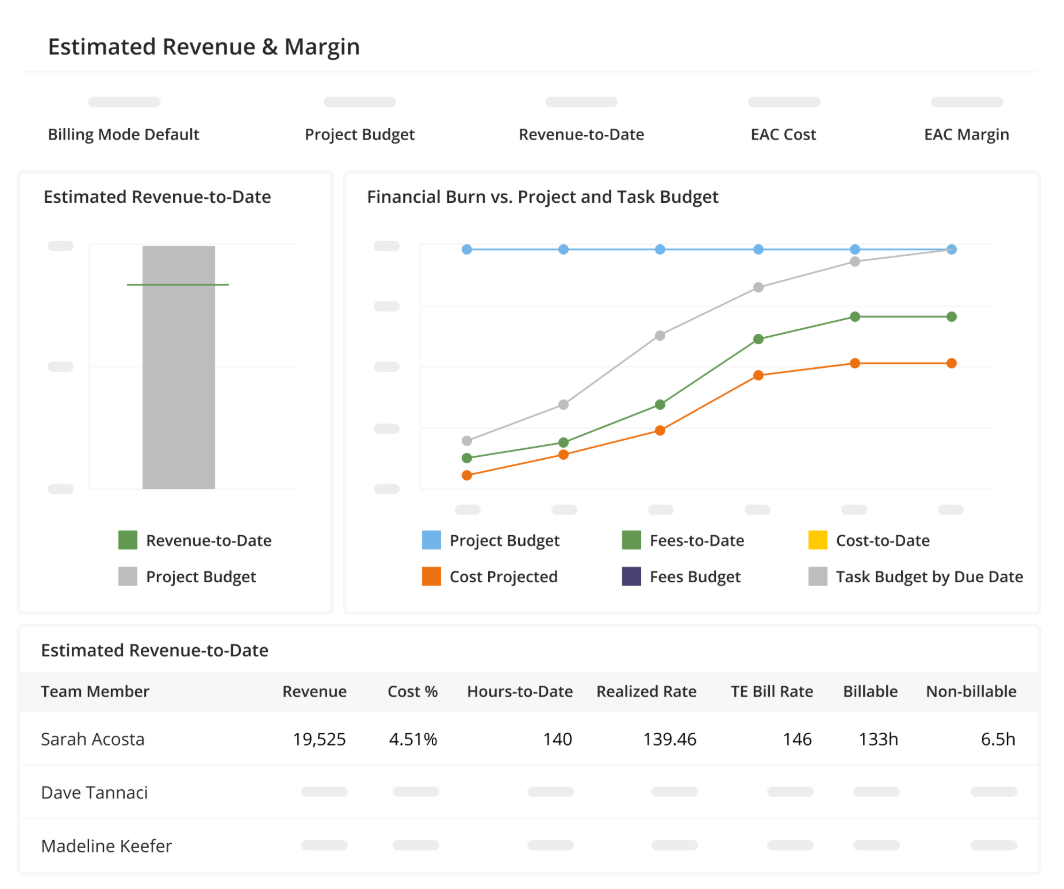
Kantata (formerly Mavenlink) is a PSA platform built for mid-market and enterprise consultancies and agencies. It focuses on resource optimization, scenario-based forecasting, and portfolio-level financial reporting.
Features you’ll like
- Workforce planning: Use “Team Builder” to automatically match staff to projects based on skills, availability, and margins.
- Scenario-based quoting: Build bottom-up work breakdown structures (WBS) with role allocations and multiple estimate scenarios.
- Portfolio reporting: Get utilization, margin, and revenue forecasting analytics—though dashboards can require exports to be truly useful.
- Kantata Pulse: Track client and employee sentiment during projects with built-in surveys.
- Enterprise integrations: Strong connections with Salesforce, NetSuite, and Concur, plus a broader marketplace of connectors compared to Scoro.
Integrations
Kantata offers over 1,200 native integrations through their marketplace, including:
- Salesforce
- Slack
- QuickBooks
- Xero
- Jira
- HubSpot
- SAP
- Xero
- Sage
- Expensify
Pricing
Kantata’s pricing is available on request.
Kantata vs Scoro
Where Kantata wins:
- Automated workforce planning: Kantata’s “Team Builder” suggests staffing based on availability, skills, and project margins—something Scoro doesn’t offer natively.
- Sentiment tracking: With “Kantata Pulse,” you can track client and employee satisfaction through project surveys, which Scoro doesn’t provide.
- Enterprise integrations: Kantata offers deep integrations with systems like Salesforce, NetSuite, and Concur, plus a wider marketplace of connectors compared to Scoro.
Where Scoro wins:
- Native CRM and sales pipeline: Scoro has built-in client, supplier, and pipeline management, while Kantata has no native CRM and relies on integrations with Salesforce or HubSpot.
- More advanced invoicing and financials: Scoro includes invoicing, purchase orders, bills, and retainers out of the box. Kantata’s invoicing is limited and often pushed into external finance tools (e.g. Sage or NetSuite).
- User-friendly across roles: Scoro supports everyone from executives needing revenue dashboards to team members logging time. Kantata is more tailored to project managers and operations teams, with a heavier interface.
Bottom line: Kantata is best for larger firms focused on resource optimization and portfolio-level forecasting. Scoro is a stronger choice for firms that want a complete business management system—covering sales, delivery, billing, and reporting—in one place.
3. Synergist

Synergist is a UK-based agency management platform that’s been serving creative agencies, marketing firms, and consultancies for over 20 years.
With over 15,000 users and over 4.2 million projects, Synergist positions itself as “all-in-one agency management software” designed specifically for agencies that want to grow “smartly and smoothly.”
Features you’ll like
- Real-time budget tracking: Monitor project budgets with automated alerts to prevent over-servicing and maintain profit margins throughout project delivery
- Custom reporting and analytics: Access live dashboards and create custom reports with your core KPIs
- Project templates: Build repeatable templates to keep project management consistent and workflows on track across similar client work
- Client recovery rate monitoring: Track how much you’re recovering from each client account to make sure every relationship meets your profit targets
- Timesheet approval workflows: Implement approval processes for time tracking to maintain accuracy and billing integrity
- Resource management and utilization charts: View real-time team capacity, workloads, and utilization rates with forecasting across days, weeks, and months
Integrations
Synergist offers nearly 20 direct integrations, focusing on essential tools for agency management like:
- Xero
- QuickBooks Online
- Sage
- HubSpot
- Salesforce
- Microsoft 365
- Google Workspace
- Slack
- Microsoft Teams
- Outlook Calendar
Pricing
Synergist offers three pricing tiers plus a variable one-time onboarding fee depending on your business needs:
- Foundation: $74/month base + $44-72/month per full user + $17-28/month per timesheet user (minimum $402/month)
- Professional: Same user pricing + $871/month minimum
- Enterprise: Same user pricing + $2,144/month minimum
Synergist vs. Scoro
Where Synergist wins:
- Specialized overservicing prevention: Synergist offers real-time budget alerts and client recovery rate monitoring that makes it even easier to protect profitability
Where Scoro wins:
- Advanced quoting capabilities: Scoro’s matrix-style quoting with approval workflows is more detailed than Synergist’s basic quoting system
- More pre-built integrations: Scoro’s Marketplace offers 60+ integrations, while Synergist only integrates with about 20 different platforms
Bottom line: Synergist is a great choice for UK agencies focused on project management and preventing overservicing. Scoro is the better fit if you need to bring quoting, resourcing, delivery, billing, and reporting into one system. It’s particularly suited to firms with 50+ people, retainer or multi-phase projects, or multi-entity operations.
4. Monday
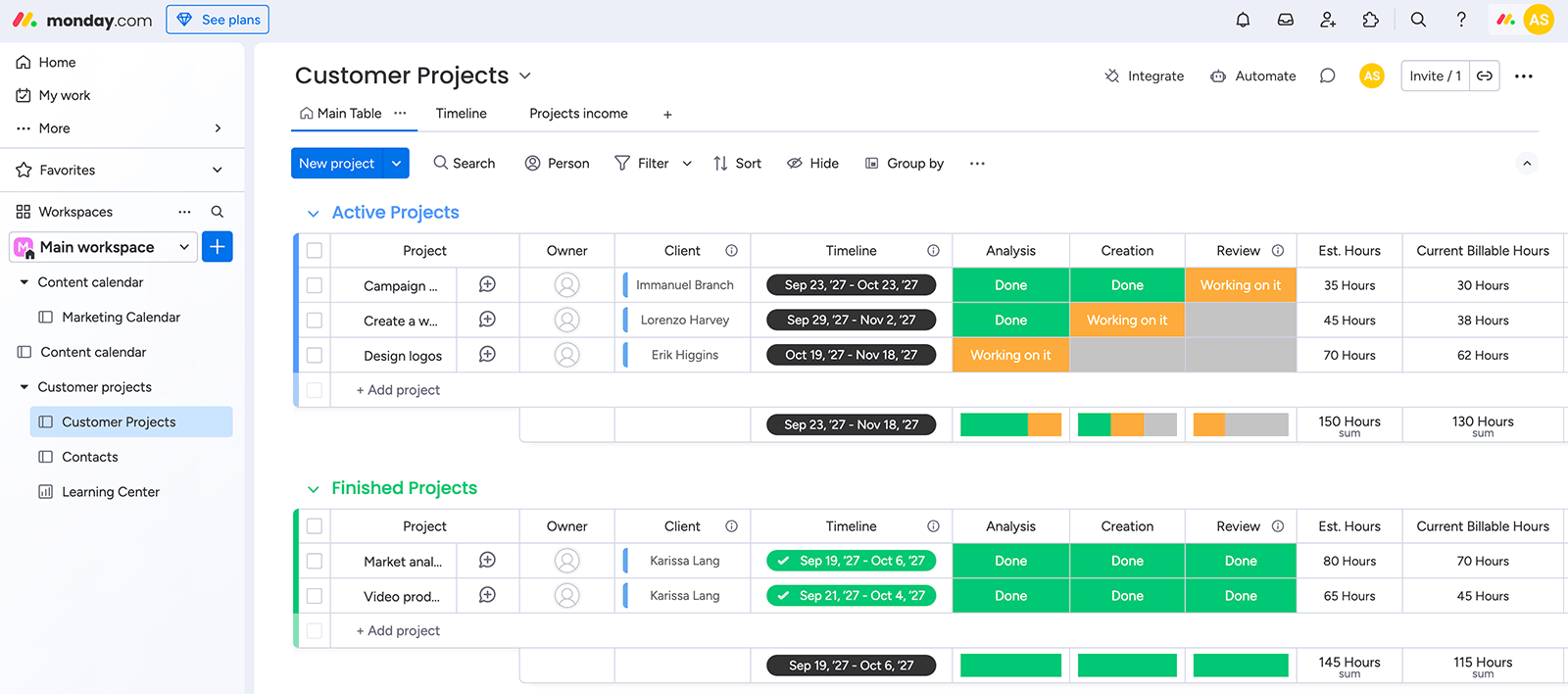
Monday is a versatile work management platform that serves over 245,000 customers across various industries, from startups to Fortune 500 companies.
The platform positions itself as an “AI work platform for any kind of work.” Monday centralizes project tracking, resource planning, and team collaboration. And you can track business development with the Monday CRM.
Features you’ll like
- Centralized team collaboration: Keep all communications visible with project updates, task comments, and team discussions happening directly on project boards
- Flexible customization: Use the drag-and-drop interface to customize project structures and workflows (without needing technical expertise)
- Multiple project views: Switch between Kanban boards, Gantt charts, calendars, and timelines to match your team’s preferred working style
- Resource management: Track team capacity and workloads with visual resource planning tools
- AI-powered insights: Use Monday’s AI to identify portfolio risks, categorize project requests, and create detailed project plans automatically
- Dashboard reporting: Create custom dashboards and reports to track project progress, team performance, and other key business metrics
- Automated workflows: Automate task assignments, status updates, and other notifications to reduce manual admin work
Integrations
Monday connects natively with over 200 tools, including:
- Slack
- Gmail
- Microsoft Teams
- GitLab
- Mailchimp
- Excel
- Outlook
- DocuSign
- QuickBooks
- Xero
Pricing
Monday offers five subscription plans:
- Free: Two seats and three boards
- Basic: $9 per user/month (billed annually)
- Standard: $12 per user/month (billed annually)
- Pro: $19 per user/month (billed annually)
- Enterprise: Custom pricing
Monday vs. Scoro
Where Monday wins:
- Superior flexibility: Monday’s visual, drag-and-drop builder makes it easier to create custom workflows
- Intuitive interface: Monday’s user-friendly, colorful design helps teams adopt it quickly
- AI and automation: Monday’s AI features let you get manage projects more efficiently and automate key steps of your workflows
Where Scoro wins:
- Designed for professional services: Scoro is purpose-built for agencies and consultancies, with features like retainer project management, billable hour tracking, and client rate cards that Monday doesn’t offer
- Financial integrations: While Monday offers hundreds of integrations, it’s missing key tools like Salesforce, FreshBooks, Sage, and Expensify. If integrating sales and financial data is important to you, check out Scoro’s integrations instead.
Bottom line: Monday is super flexible and easy to use for project management, but requires multiple products for end-to-end business management. Scoro offers everything professional services firms need to run a profitable company in one spot.
5. Toggl (Track + Plan combo)
Toggl offers two complementary tools that work together to handle time tracking and resource planning for professional services teams.
Toggl Track focuses on simple, accurate time tracking that lends itself to 100% user adoption rates. Founded in 2006, Toggl Track serves over 5 million users globally and is particularly popular with agencies.
Toggl Plan provides visual resource management with drag-and-drop scheduling. It’s designed to help teams manage workloads, schedule projects, and avoid overload by visualizing capacity.

The combination of Toggl Track and Plan gives you decent project management capabilities focused on time optimization and team scheduling.
Features you’ll like
- Simple time tracking: Track time with one-click desktop browser extensions or from your phone
- Automated time capture: Automatically turn calendar events and desktop activities into time entries so billable hours don’t slip through the cracks
- Project budget monitoring: Set fixed budgets or hourly rates and track performance in real time to prevent overservicing
- One-click invoicing: Convert tracked hours into client-ready invoices directly from summary reports
- Visual resource planning: Use color-coded calendars with drag-and-drop scheduling to see team availability and prevent overbooking
- Custom reporting dashboards: Filter and group time data by user, team, client, or project to get insights into utilization and profitability
- Timesheet approval workflows: Set up efficient review processes to protect billing accuracy
Integrations
Toggl Track offers over 100 browser extensions for time tracking and eight native integrations:
- Asana
- Jira
- Google Calendar
- Outlook Calendar
- iCal
- QuickBooks
- Salesforce
- Toggl Plan
Toggl Plan has three integrations: Slack, Google Calendar, and Toggl Track.
Pricing
Toggl Track offers four pricing options:
- Free: $0 for up to 5 users
- Starter: $10 per user/month
- Premium: $20 per user/month
- Enterprise: Contact sales
Toggl Plan also offers four pricing options:
- Free: $0 for up to 5 users
- Capacity: $6 per user/month
- Starter: $9 per user/month
- Premium: $15 per user/month
Toggl vs. Scoro
Where Toggl wins:
- High user adoption rates: Toggl Track claims to achieve 100% user adoption rates because of its simplicity and ease of use
- Browser extensions: Over 130 browser extensions let you track time directly within the tools you’re already using, whereas Scoro’s timer offers less granular tracking
- Free option: Toggl Track and Toggl Plan are both free for up to five users, making them a great option for small teams who want to track time and plan resources without any investment
Where Scoro wins:
- All-in-one business management: Beyond time-tracking and resource management, Scoro also includes CRM, quoting, invoicing, and client management capabilities, while Toggl requires multiple separate tools for complete business oversight
- More integrations: Scoro offers over 60+ native integrations compared to Toggl Track’s eight and Toggl Plan’s three
Bottom line: Toggl is great for teams that just need simple, accurate time tracking and resource scheduling, while Scoro covers the entire quote-to-cash process with extensive integrations for professional services firms.
6. Teamwork
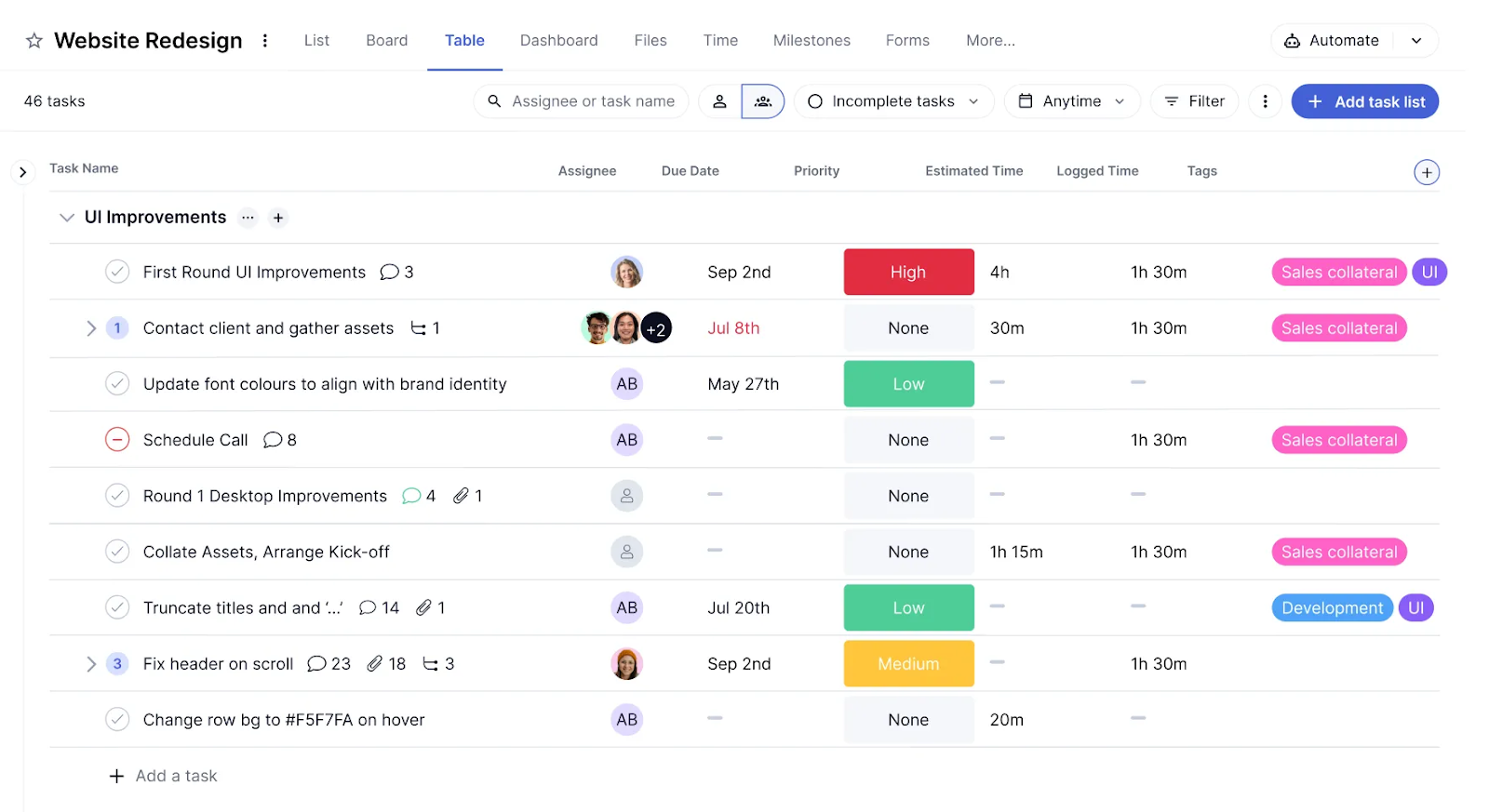
Founded in 2007, Teamwork is a project and business management platform that serves over 16,000 businesses worldwide. The platform combines project management, resource scheduling, time tracking, and client communication tools in one system.
Features you’ll like
- Flexible project views: Jump between lists, boards, or Gantt charts depending on what works best for your team and the project you’re tackling
- Resource scheduling: See who’s swamped and who’s got bandwidth so you can balance workloads
- Project health report: Projects are listed as “Good,” “At Risk,” or “Needs Attention” based on tasks completed so you can spot trouble before it gets messy
- Time tracking: Logged hours get filed right into project budgets and invoices, reducing the risk of manual errors
- Custom intake forms: Design them however you want to gather key info and hit the ground running
- TeamworkAI: Get instant answers to questions like “who’s overbooked?” and turn updates into tasks with one click
- Client portal: Let clients review project progress, approve changes, and chat with your team in one place
Integrations
Teamwork integrates with 17 tools, including:
- Slack
- Microsoft Office
- HubSpot
- Xero
- Stripe
- Harvest
- Zapier
- QuickBooks
- Google Workspace
- Salesforce
Pricing
Teamwork’s pricing includes a free plan and four paid tiers:
- Free: $0 for up to 5 people
- Deliver: $9.99 per person per month
- Grow: $19.99 per person per month
- Scale: $54.99 per person per month
- Enterprise: Pricing on request
Teamwork vs. Scoro
Where Teamwork wins:
- Exceptional client portal: Teamwork lets clients view project progress, give feedback, and create their own tickets, whereas Scoro’s customer portal is more project-based and lets clients view key documents and information and make comments
- User-friendly interface: With fewer features, Teamwork is arguably easier to navigate (especially for teams just starting out)
- Easier team collaboration: Teamwork has a chat app and Notebooks for real-time collaborative documentation, while Scoro only lets you comment on projects and upload key docs
Where Scoro wins:
- Does everything in one place: Scoro handles your CRM, granular matrix-style quoting, invoicing, and financial stuff natively, whereas Teamwork is more basic
- Better financial reporting: Scoro offers a unique three-tier revenue model (Earned, Recognized, Forecasted) for full financial visibility whereas Teamwork’s financial reporting is more basic
- More integrations: Scoro has over 60+ pre-built integrations and Teamwork only has 17, giving you more (and faster) ways to connect existing tools
Bottom line: Teamwork is great for easy project management and team and client collaboration. Scoro gives you everything you need to run a services business from one spot.
7. Productive
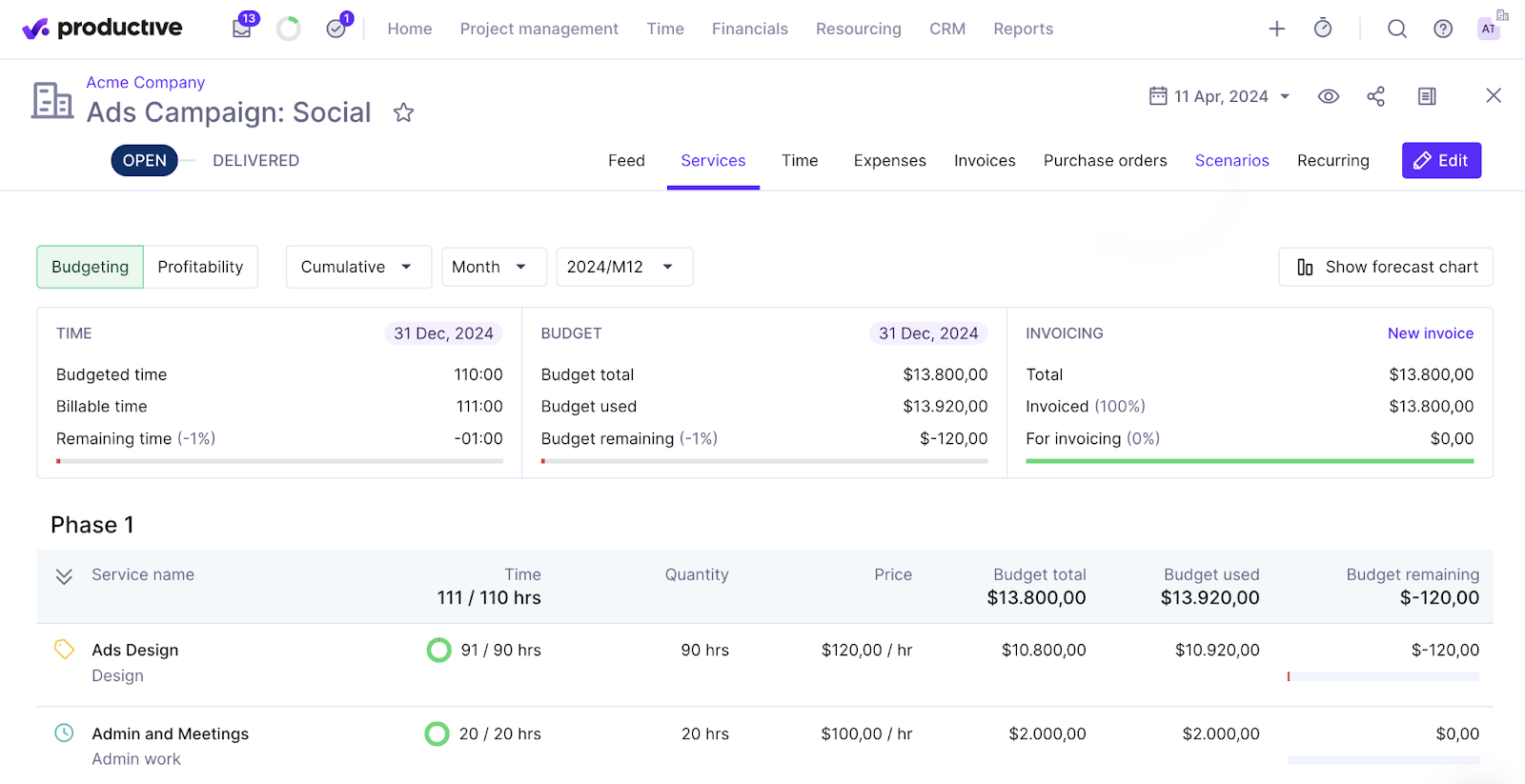
Productive is a project management and business operations platform built for agencies and other professional services firms. Founded in 2014, over 1,500 companies use it to manage projects, track time, optimize team utilization, and report on performance.
Features you’ll like
- Budgeting and reporting: Build budgets with burn charts and sections (like phases), and access a broad report library—though advanced reports like utilization and revenue forecasts are limited compared to Scoro.
- Expense management: Snap a picture of a receipt and let OCR/autofill handle the entry
- AI features: Includes AI-assisted reporting, task summaries, smart search, and an AI writing assistant
- Lightweight CRM: Track contacts and open deals, but without advanced quote-to-project flows or proposal sending
- Time tracking: Log hours at the task, daily, or weekly level
- Resource planning: Forecast capacity and manage placeholders, though scheduling remains project-level and less connected to tasks
- Invoicing: Generate invoices from time and budgets, with payment tracking—though all invoices must originate in Productive and tie back to budgets
Integrations
Productive offers over 25 native integrations with key accounting and HR platforms, including:
- HubSpot
- Slack
- Google Calendar
- Outlook / Microsoft Calendar
- Sage
- QuickBooks
- Xero
- Personio
- Jira
- Zapier
Pricing
Productive offers three pricing plans:
- Essential: $9 per user/month (billed annually)
- Professional: $24 per user/month (billed annually)
- Ultimate: $32 per user/month (billed annually)
Productive vs. Scoro
Where Productive wins:
- Intuitive interface: A sleeker, more modern UI compared to some legacy PSAs
- Expense entry: Faster and more intuitive expense submission
- Focused scope: Ideal for agencies that want a project operations tool without broader business management layers
Where Scoro wins:
- Comprehensive CRM and sales pipeline: Scoro offers full CRM functionality with deal stage tracking, lead nurturing, and revenue forecasting, while Productive’s CRM features are more basic
- Advanced quoting system: Unlike Productive, Scoro offers matrix-style quoting to assign roles, hours, and costs to deliverables and includes approval workflows to keep estimates accurate. You can also send and track quotes within Scoro, while Productive only offers downloadable PDFs to email separately.
- More integrations: Scoro has 60+ pre-built integrations with tools like Salesforce, Asana, and Stripe, compared to Productive’s 25 direct integrations
Bottom line: Productive is best for small-to-mid-sized agencies looking for a sleek project management tool with strong budgeting and expense tracking. Scoro is the better fit for firms needing advanced CRM, quoting, and financial management in one platform.
Why Scoro might be the best choice for your firm
Scoro was built specifically for professional services firms who want everything in one place: CRM, project and resource management, quoting, time tracking, and financial reporting.
If you’re just starting out or only need basic project tracking, Scoro might not be right for you (yet).
But if you’re farther along in your business maturity and ready to stop juggling eight different tools, we’re hard to beat.
Plus, you get transparent pricing and 60+ integrations including the financial tools other platforms miss.
Don’t just take our word for it—check out our customer stories to see how countless professional services firms around the world have used Scoro to grow their business.
Then, sign up for our free 14-day trial to find out how we can help you grow yours.





